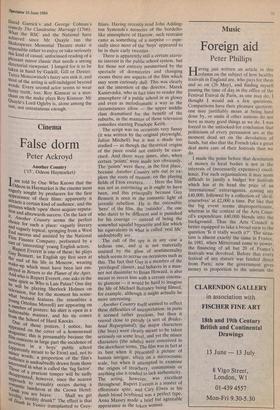Cinema
False dorm
Peter Ackroyd
Another Country ('15', Odeon Haymarket)
Iam told by One Who Knows that the Odeon in Haymarket is the cinema most eagerly sought by producers for the first appearance of their films: apparently it attracts a certain kind of audience, and the Pictures which 'open' there acquire reputa- tion and afterwards success. On the face of it, Another Country seems the perfect Choice for such a place: vaguely literary and vaguely topical, springing from a West E rid success and assisted by the National Film Finance Company, performed by a cast of 'interesting' young English actors.
Rupert Everett is one of these; he plays
Guy Bennett, an English spy first seen at the end
of his life in Moscow, wearing
Make-up which must have been last em- ployed in Return to the Planet of the Apes. And who is Rupert Everett, one asks in the Same spirit as Who is Luis Pulau? One day telex will be playing Sherlock Holmes on elevision, but for the moment his some- what bruised features (he resembles a young Ottoline Morrell) are appearing on fnumber of posters: his shirt is open in a ifrashionable manner, and his tie comes
One School of Hard Knocks.
a of those posters, I notice, has PPeared on the cover of a homosexual Magazine; this is presumably because the in-vinerTonncerns in large part the incidence of
in a boys' public school
(apparently meant to be Eton) and, not to alnidnce
words, a proportion of the film's
La, tence is undoubtedly drawn from those d".Terested in what is called the 'fag factor'. ose of a prurient temper will be sadly aPPointed, however, since the nearest ;0PProach to sexuality occurs during a ,Gilla,ntic luncheon at the Crown Hotel: ter,..°.s,n You are brave. . Shall we get ,',.,°1Y, terribly drunk?' The effect is that yeath In Venice transplanted to Grey-
friars. Having recently read John Adding- ton Symonds's memoirs of the bordello- like atmosphere of Harrow, such restraint came as something of a surprise — espe- cially since most of the 'boys' appeared to be in their early twenties.
There is apparently still a certain atavis- tic interest in the public school system, but for those not entirely mesmerised by the spectacle of dormitories and changing rooms there are aspects of the film which may seem curiously dull. This was clearly not the intention of the director, Marek Kanievaska, who in fact tries to render the atmosphere of a public school in as glossy and even as melodramatic a way as the circumstances allow — the upper middle class dramatised for the benefit of the suburbs, in the manner of those television comedies starring Penelope Keith.
The script was on occasions very funny (it was written by the original playwright, Julian Mitchell) but it was a shade too studied — as though the theatrical origins of the piece could not entirely be exor- cised. And there were times, also, when certain 'points' were made too obviously. The 'points' were there, in the first place, because Another Country sets out to ex- plore the roots of treason: on the playing fields of Eton etcetera. . . . Here the film was not as convincing as it ought to have been, and this principally because Guy Bennett is seen in the romantic light of juvenile rebellion. He is the ostensible `hero' of the film, the 'outsider', the one who dares to be different and is punished for his courage — instead of being the somewhat squalid hypocrite and liar which his equivalents in what is called 'real life' undoubtedly are.
The cult of the spy is in any case a tedious one, and it is not materially assisted by the glow of sentimentality which seems to accrue on occasions such as this. The fact that Guy is a member of the `privileged' classes, and behaves in a man- ner not dissimilar to Brian Howard, is also meant to invest him with a certain cinema- tic glamour — it would be hard to imagine the life of Michael Bettaney being filmed, for example, although it might actually be more interesting.
Another Country itself seemed to reflect these difficulties of interpretation: in parts it seemed rather precious, but then it veered close to parody (a sort of Brides- head Regurgitated); the major characters (the boys) were clearly meant to be taken seriously on some level, and yet the minor characters (the adults) were conceived in the sketchiest terms. The film was in fact at its best when it presented a picture of human intrigue, albeit on a microcosmic scale, but when it attempted to examine the origins of treachery, communism or anything else it tended to lack authenticity. The acting, however, was excellent throughout: Rupert Everett is a master of effeminate spite, and Cary Elwes as his dumb blond boyfriend was a perfect type. Anna Massey made a brief but agreeable appearance as the token woman.












































 Previous page
Previous page